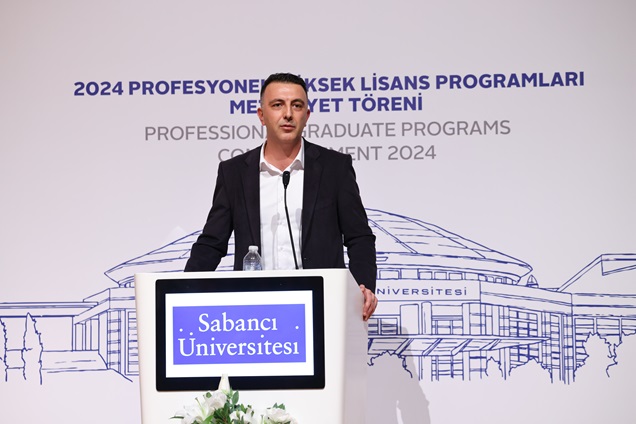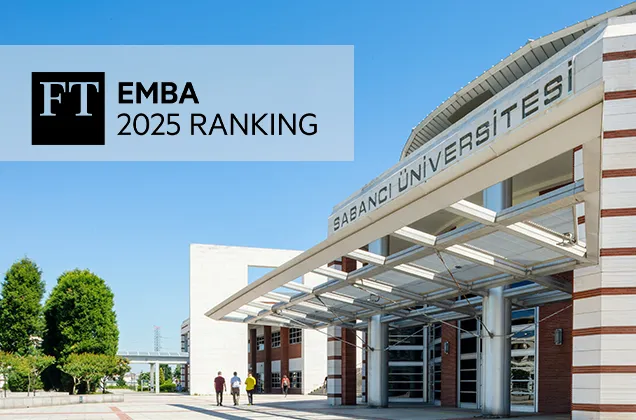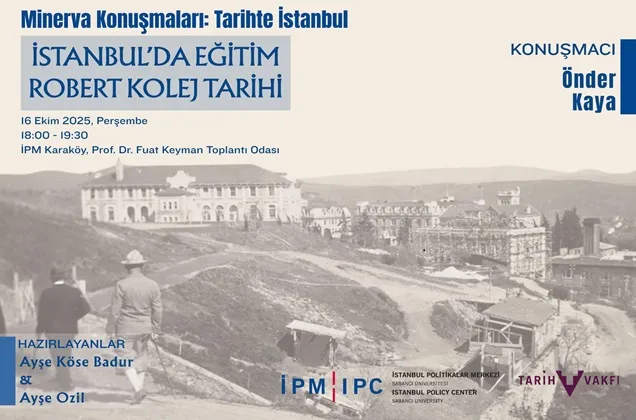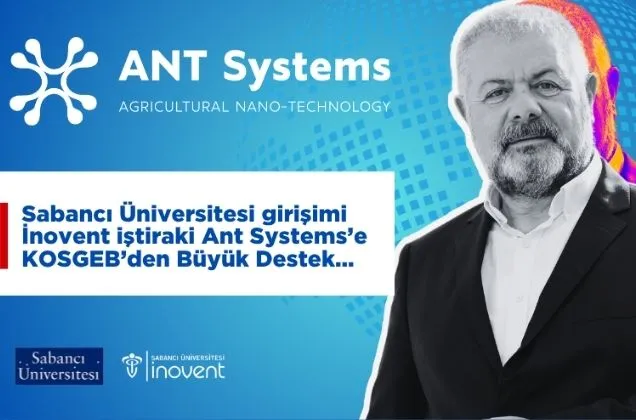18/10/2024
Sabancı University Professional Master's Degree 2022 graduate Alpay Aydın answered our questions about his EMBA experience.

- First, can you briefly tell us about yourself? In which year and in which department did you complete your Professional Master's degree?
I graduated from Istanbul University Faculty of Economics in 2004 and received my Sabancı University Executive MBA degree in 2022. I started my banking career in the Akbank Transaction Banking Department. At the end of 2008, I joined Garanti Bank. Here, in addition to my branch manager position, I worked in cash management as Sales, Business Development and Marketing Manager. During this period, I undertook critical duties such as Working Group Presidency and sector representation in the Banks Association during important change and transformation processes for the sector. Finally, after leading the ‘Retail Banking Transformation Project’ at Garanti Romania, I joined Yapı Kredi Bank this year and currently continue to serve as Cash Management Director.
- What motivated you to do an Executive MBA at Sabancı University?
To be honest, learning is a passion for me. When I look back today, I see that one of the most important characteristics that made me successful in my career was that I said “yes” to every new learning opportunity that came my way in my business life, with a very high level of motivation, and these opportunities are not always given to you on a silver tray. These sometimes involve great difficulties and even risks; however, these challenging tasks and learning opportunities also make you grow in every sense. Sabancı University is one of the leading educational institutions not only in our country but also in the world. The Executive MBA is a very challenging program both in terms of its content and its fast pace. Our esteemed professors who lead the program are not only the most important academics in the country, but many of them are also the leaders of the sector who have previously achieved great success in their own fields of work. Again, those who are included in the program are selected at the end of a very special process. They are ‘the best of the best’, as my esteemed professor Yusuf puts it. Therefore, the participants also add a special value to the program. As I mentioned at the beginning, I embrace every difficult journey that will add value to me with high levels of motivation. I can say that Sabancı University Executive MBA was perhaps one of my most valuable journeys.
- How did you balance the requirements of the program with your professional responsibilities?
Well, this was quite challenging. It is not easy to balance the important responsibilities and high tempo of your job on the one hand, and the challenging high tempo of EMBA on the other. Frankly, I can say that I achieved the balance by cloning myself. It is a one-year adventure, neither too short nor too long. I found the solution in embracing the process with high motivation on both sides, pulling my focus to the top and bringing my effort and performance to the highest possible level.
- What was the most challenging aspect of the program and how did you overcome it?
The most challenging aspect of the program, rather than the most challenging aspect of my life, was the time I stole from my family. While I was the father of two lovely daughters, aged 3 and 9, who I was very fond of, it was a bit annoying to be away from them and my beloved wife. However, my wife and daughters supported me with understanding, which was very important. Of course, they were planning to take their revenge after graduation, but after the EMBA, I took on a challenging one-year overseas assignment. The good thing was that I was in Romania and could come back often. Fortunately, we are together again, and now we are enjoying our time together after this two-year process.
- Can you tell us about your experience working in teams and on projects outside of class hours? How did it benefit your learning?
First of all, group projects were very valuable. During these projects, I can say that although the work we did with valuable friends from different sectors and with different perspectives, sometimes late at night, was tiring, we really enjoyed working and learning. I can say that group work, especially with the diversity created by participants with different backgrounds and competencies, benefited us beyond our expectations.
- Is there a detail that you have been impressed with while you were at the university, that you will never forget in terms of education and/or faculty?
Frankly, each one is very valuable and I really cannot make a distinction, but if I have to choose one, it will be a bit of a ‘spoiler’ but I think I would say ‘CEO of Turkey’. I can say that it was a really impressive part and everyone put a lot of money in their pockets. As someone who spent a significant part of 20 years of my career in sales and marketing, I would like to create some curiosity without giving more details.
- How did the program help you develop your leadership, negotiation or entrepreneurship skills?
Although the program focuses on certain courses, it has a general structure that develops the leadership competencies of the participants. I can say that the discussion environment you are in with a successful and ambitious team from different sectors and who are prominent in their own fields will inevitably help develop your negotiation skills. In terms of entrepreneurship, both the group work and the structure that feeds on diversity and forces you to look ‘out of the box’ were very effective.
- Can you share your experiences during your educational trip to Columbia Business School in New York? How did it enhance your education?
Columbia University is the oldest university in New York state and the fifth oldest in the US. In addition, in the 2022 issue of U.S. News & World Report, the most widely used university ranking in the US, it was ranked as the second-best university in the world, after Princeton, along with Harvard and MIT; and in 2021, it left behind universities such as Yale, Princeton, Oxford, and Stanford, with an acceptance rate of 3.7%, closely following Harvard University (3.4%).
Frankly, we crowned this wonderful one-year process with Columbia Business School education, and I can say that we truly made the finale at the top of the hill. This final touch, which became even more valuable with the content, the quality of our professors at CBS and the fact that they also have knowledge about Turkey and us since it is repeated every year, was truly amazing.
- What was the most valuable takeaway from the CBS courses on negotiation, leadership or entrepreneurship?
I can say that the content was prepared meticulously, in a way that would be quite impressive, since it was a short-term educational trip at the end of the program. You receive these training sessions from world-renowned academics and, due to the duration, care was taken to make them as effective and striking as possible. Frankly, many come to mind, but what impressed me the most was the interactive group work that allowed us to create our own roadmap towards our own values. I still keep the relevant cards at home.
- How did the EMBA program affect your career path or provide you with new opportunities?
As you know, working in large and high-quality institutions has many positive aspects, but there is also the difficult aspect that you are not the only successful one. While things were going very well at Garanti and I was experiencing a new peak in my career, at this time I was stuck, partly due to some temporal misfortune, since we had also come across a period when banks were not growing. I was stuck and, again, as before, it was clear that I had to do something different to overcome the bottleneck, and although I was confident in myself and my resume, the master's degree that I felt was missing bothered me at that time.
In my 40s, when my wife had important responsibilities, and I was a father of two daughters, aged 3 and 9, who I was extremely fond of, and was working in one of the largest branches of the bank and in the middle of one of the strangest periods the sector had ever seen, going for a master's degree seemed a little crazy to me. When I shared my idea with my friends during one of our friendly chats, one of the closest ones said: "Your girls will be going to university soon and you are talking about a master's degree; don't ruin your comfort." Personally, I really wanted to ruin my comfort and decided to follow the path of the goal I had set for myself.
I think EMBA is a great resilience test for companies. The difficulty of the program is known to everyone. And you have a work and family balance to keep. When you do your part at this pace, you become the hero who jumps to the last stage of the war games. Garanti Bank also saw this and offered me a job as an expat in Romania, this time as the leader of an important project and a specially selected senior team, as the leader of the ‘Retail Banking Transformation Project’.
- Can you tell us about the networking opportunities provided by the program, both with your classmates and international connections like at Columbia?
I have to say this clearly: I would do it again, not just once but several times. My Sabancı EMBA experience was incredible. There is no need to mention the quality of the institution and our valuable professors, to whom many thanks. It was highly valuable to put the teachings you thought you knew on the table again, blend them with your current experience, interpret them again, and learn differently. It was also a great experience to go through this process with participants who were selected from different sectors and were leaders in their fields.
For example, for the last 2 years, we have been coming together within the scope of the ‘peer learning’ initiative (the third of which will be held this year) that has been implemented at our university under the leadership of former graduates, and we continue to learn from each other. This is an example, but we are not limited to this, the network is critical in every sense, and we definitely support each other and keep it alive. Of course, we do not neglect to continue to have fun in between.
If I ask what I would have done better, I think I would have maintained the connection with our professors and contacts at CBS. It is not too late yet, but I can recommend that our dear candidates maintain their networks while they are fresh.
- What advice would you give to current or future Executive MBA students to get the most out of their experience?
I would recommend that they apply what they have learned in their own areas of responsibility without delay. They should look for these opportunities in their current roles. Learning is very important, but when you can apply what you have learned, it becomes your muscle and provides an important privilege for sustainable high performance.
In the meantime, it is also very important not to shy away from using what we have learned in a different way, not to be afraid of making mistakes, to be brave, and to take risks. For example, I applied the ‘bottleneck’ analysis that we learned in the operations course, which is highly meaningful for service/production processes, but can be difficult to adapt in terms of customer relations, to the largest portfolios in a branch of the bank that I had just taken over, which were the most important, but had performance problems. It was a bit of a risky application, but it became one of the main factors in our incredible success in the following period with its tremendously positive results in terms of efficiency, team motivation, and leadership.




